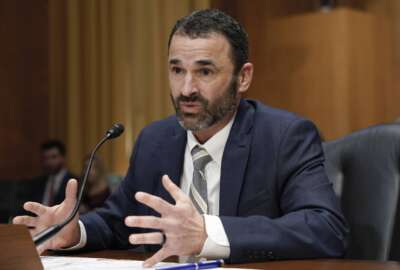A federal auditor wins a prestigious award from academia
The chief operating officer of the Government Accountability Office (GAO) has received recognition from a leading university public administration program. Orice...
The chief operating officer of the Government Accountability Office (GAO) has received recognition from a leading university public administration program. Orice Williams Brown, who has worked at GAO for more than 30 years, got the Excellence in Federal Leadership Award from the public administration and policy department at American University. For more, the Federal Drive with Tom Temin spoke with Ms. Brown.
Interview Transcript:
Ms. Brown joins me now. And it’s good to have you back. And you are now the or have been for some time now, the chief operating officer of the GAO. And tell us, why did they give you the award?
Orice Williams Brown Thank you for having me. I’m happy to be back. And, you know, interesting question. So when I looked at the nomination, Gene Dodaro, the Comptroller-General, nominated me for this award. With this award, they really look for two things. One, they look for executives that are really focused on executing the mission, carrying out in agency’s mission, but also and as importantly, they look for leaders who are focused on developing and investing in the next generation of leaders in their organization. That appears to be the big driver in terms of how I was selected to be one of the recipients of the award.
Tom Temin And investing in the next generation. That means one thing in the private sector, in the public sector. Well, you can promote people quickly and give them responsibility quickly. You can’t give them stock options. You can’t give them giant bonuses, maybe sometimes some something of a bonus, but not like corporate. And so maybe discuss what some of the challenges are in bringing people along where, well, you’re not going to get triple the money here, but you’ll get triple the responsibility.
Orice Williams Brown Yes. I mean, I think when people are attracted to public service, it really is about the mission of helping the government function. And in GAO’s case, it’s helping the government function for the benefit of the American people. So when I think about kind of that investment in giving back to future leaders, it really is training, mentoring, coaching, ensuring that they are getting all of the tools that they need to effectively execute their jobs.
Tom Temin And one of the things in having stewardship of GAO, I think must be in your mind. It would be in my mind, let’s put it that way. And that is GAO has been relatively or maybe totally free of the kind of sort of periodic scandals and giant failures that plague almost every institution in public life, public and private, and the continuity of maintaining a certain level of standards and excellence. That’s, I believe, is probably the chief challenge. What is the GAO thinking on that?
Orice Williams Brown So I think.
Tom Temin Knock on wood, as they say.
Orice Williams Brown Yes, yes. We continue to really focus as we bring people into the organization. There is a definite recognition that you’re part of the accountability community, and we stress that we have to because we are going into other agencies, we’re looking at what they’re doing and how they’re functioning. So we also have to make sure that we turn a critical eye internally and make sure that we are walking the talk. We recognize that we live in a glass house, and I think we have to make sure that we are also being responsible stewards of the taxpayers dollars. And that’s something that we really do work hard to instill into folks when they come into the organization. And it’s something that carries forward in the decisions that I make. I’m always thinking, yes. or is the GAO employee? But there’s also or is the taxpayer who’s sitting on my shoulder saying like, you know, is that the highest, best use of taxpayer dollars?
Tom Temin And GAO regularly finds things that are embarrassing, frankly, to agencies, and yet I’ve never heard a GAO person say, look what those idiots did or I imagine that’s not what you say to them either. And do you ever would you fire someone or do you watch for people that maybe take that attitude because, hey, I’m from GAO. How could you morons have let this program get to the state? It’s always in a respectful way that problems are laid out with an objective issues tone and not a personal tone.
Orice Williams Brown Yes, because, I mean, we want to make sure, one, that we are that we’re being respectful. We want to make sure that we are we mean it when we say we’re here to help. And that’s what we let agencies know that we really are in the business of not only helping Congress carry out its constitutional responsibilities, but making sure that agencies are working efficiently and effectively for the American people. And in order for us to do that, we have to make sure that we are sharing what we find. It’s based on the evidence, letting the evidence speak for itself, and then also communicating in a constructive way. And we work hard to make sure that our engagement is constructive.
Tom Temin We’re speaking with Orice Williams Brown. She’s the chief operating officer for the GAO and the recipient of the Roger W. Jones Award for Excellence in Federal Leadership, given every year by American University. And you’ve been at GAO, I think, what, 30 years plus now, and give us a quick review.
Orice Williams Brown So. I came to GAO directly from graduate school. I, unlike a lot of folks that that are going into public service today, I did not set out to be a public servant. I have an MBA. My plan was to work on Wall Street and that was what I thought I was going to do with my life. I came out of graduate school at a time when Wall Street was really flooded with folks with lots of experience and MBAs and being a newly minted MBA. And my job prospects on Wall Street weren’t great at that particular time. I started thinking about other alternatives. GAO recruited on campus and I went to an information session, was not familiar with GAO. I didn’t really want to work in federal service, but the mission of the agency intrigued me. So I thought, why not give it a try? Found out we had an office in in Norfolk and it was close to Virginia Beach, and I said maybe a cool place to work for a couple of years and then, you know, move on to my intended career. But my very first week on the job, I knew this was going to be my career. The mission of the agency very first week, you know, went on an interview to interview one of the local county executives, the bill, the ability to get out on the audit trail and to be part of the accountability community and, you know, make sure that the government’s being responsible stewards of the taxpayer money really spoke to me. So I grew up in the organization. I started with an entry level position, and I have moved up throughout the organization. I spent a big part of my career doing work in the financial markets and housing area. And then as I moved into senior management, I spent several years in our Office of Congressional Relations before becoming the chief operating officer. So when I work with leaders, I can honestly say I’ve been where they are in many cases because I’ve done most of those positions in the organization.
Tom Temin Do you ever think about the millions and billions you for went because you didn’t stay on Wall Street or didn’t join Wall Street and stick around?
Orice Williams Brown You know, sometimes, yes. But I think what I’ve gotten out of being a public servant, I think I have earned in many other more meaningful ways.
Tom Temin And what’s your best advice for those that are coming into the workforce now? They face an economy and a political situation and a future that probably didn’t look as great to people like you that joined the workforce some 30 years ago or me close to 50 years ago.
Orice Williams Brown Yeah, no, it’s different. But I think in many ways many of the employees of the future are also not totally tied to the paycheck. They also want purpose in in their careers. And I think the government is a way to have that. You can have that purpose. And if you want to have an impact on people’s lives, this is a way to do it because of the federal government. It touches so many aspects of our lives and in many ways kind of behind the scenes to make sure we are safe and taken care of.
Copyright © 2025 Federal News Network. All rights reserved. This website is not intended for users located within the European Economic Area.
Tom Temin is host of the Federal Drive and has been providing insight on federal technology and management issues for more than 30 years.
Follow @tteminWFED






